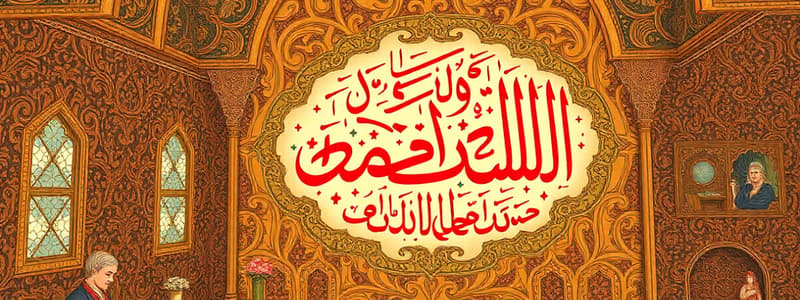Podcast
Questions and Answers
What script is primarily used to write Urdu?
What script is primarily used to write Urdu?
- Perso-Arabic script (correct)
- Roman script
- Cyrillic script
- Devanagari script
Which historical influence significantly contributed to the development of Urdu?
Which historical influence significantly contributed to the development of Urdu?
- The Indo-European language family
- Sanskrit literature
- Persian and Arabic languages (correct)
- The British colonial administration
In what ways is Urdu characterized compared to Hindi?
In what ways is Urdu characterized compared to Hindi?
- More complexity in phonetics
- Greater use of Persian and Arabic vocabulary (correct)
- Higher emphasis on Sanskrit derivations
- Simpler grammatical structure
How does Urdu function in the context of literature and music?
How does Urdu function in the context of literature and music?
What role does Urdu play in the cultural identity of Pakistan and parts of India?
What role does Urdu play in the cultural identity of Pakistan and parts of India?
Which of the following best describes Urdu's poetic traditions?
Which of the following best describes Urdu's poetic traditions?
What is a key feature of Urdu that enhances its use in communication?
What is a key feature of Urdu that enhances its use in communication?
Which of the following statements about Urdu's development is correct?
Which of the following statements about Urdu's development is correct?
Flashcards
Urdu Language
Urdu Language
An Indo-Aryan language primarily spoken in Pakistan and India, written using the Perso-Arabic script.
Urdu vs. Hindi
Urdu vs. Hindi
Key differences include their writing systems (Perso-Arabic for Urdu, Devanagari for Hindi) and vocabulary (Urdu adopts more Persian and Arabic words).
Urdu's Origins
Urdu's Origins
Historical roots trace back to the Khariboli dialect of Hindi, evolving under Persian and Arabic influence during the Mughal Empire.
Urdu's Poetic Richness
Urdu's Poetic Richness
Signup and view all the flashcards
Urdu's Cultural Role
Urdu's Cultural Role
Signup and view all the flashcards
Urdu's Standardization
Urdu's Standardization
Signup and view all the flashcards
Urdu's Usage
Urdu's Usage
Signup and view all the flashcards
Urdu's Significance
Urdu's Significance
Signup and view all the flashcards
Study Notes
Urdu Language Overview
- Urdu is an Indo-Aryan language spoken mainly in Pakistan and India.
- It is written using the Perso-Arabic script.
- Closely related to Hindi, often viewed as a register or dialect of Hindustani, with significant shared vocabulary.
- Key differences between Urdu and Hindi include writing systems (Urdu uses Perso-Arabic, Hindi uses Devanagari) and vocabulary (Urdu incorporates more Persian and Arabic loanwords).
- Urdu's lexicon is heavily influenced by Persian and Arabic, enriching its expressive capacity.
History of Urdu
- Rooted in the Khariboli dialect of Hindi.
- Developed and evolved significantly under the influence of Persian and Arabic during the Mughal Empire.
- Shaped by cultural and political interactions between various regional communities.
- Became a prominent language for administration and literature during the Mughal period.
Key Features of Urdu
- Highly expressive and nuanced in its poetic traditions.
- Rich in philosophical and literary works.
- Characterized by a wide array of poetic forms, reflecting the region's diverse poetic heritage.
- Possesses a unique stylistic sensitivity, enabling intricate and suggestive expressions.
- Used in both colloquial and formal contexts.
- Employed across various communication forms, from formal prose to casual spoken dialects, including poetry and contemporary news reporting.
- Widely used in literature, music, and daily interactions.
Development and Standardization
- Urdu's development stems from the cultural influences and linguistic exchanges within the region.
- Absorption of Persian and Arabic influences expanded its vocabulary.
- Standardized and codified throughout time.
Urdu's Cultural Significance
- Critical in preserving and transmitting cultural heritage in Pakistan and parts of India.
- Important cultural marker, strongly linked to national identity.
- Symbol of cultural unity and historical ties.
- Crucial to the social and cultural fabric of its communities, evident in its use in literature, music, and daily life.
- Closely interwoven with speakers' experiences, reflecting historical and societal contexts.
Modern Usage of Urdu
- Widely used in everyday communication across social classes.
- Employed in formal contexts, including official documents and scholarly writings, showcasing its versatility.
- Prominent in media (print and electronic), further emphasizing its importance in modern society.
- A living language, reflecting contemporary expressions and concerns of its speakers.
- Continued relevance and accessibility through diverse media platforms.
- Crucial in preserving literary and cultural heritage.
- Serves as a medium of expression for a wide range of sentiments, thoughts, and experiences in modern contexts.
Studying That Suits You
Use AI to generate personalized quizzes and flashcards to suit your learning preferences.




